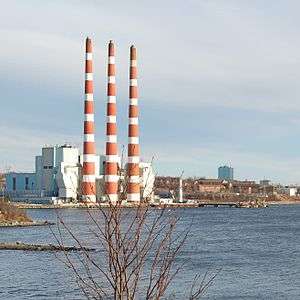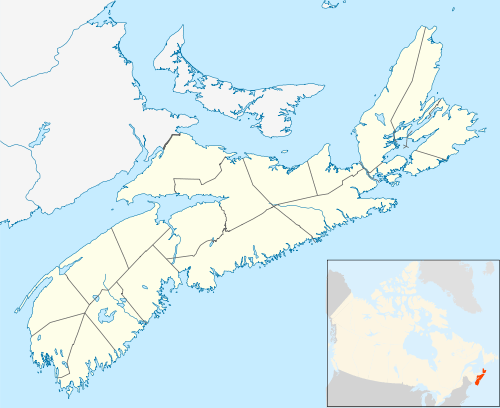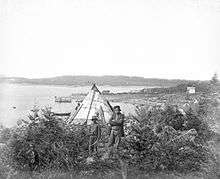Tufts Cove, Nova Scotia
Tufts Cove is an urban neighbourhood in the Dartmouth area of Halifax, Nova Scotia, Canada. It is situated on the eastern shore of Halifax Harbour in the North End of Dartmouth. The neighbourhood boundaries of Tufts Cove are approximately from Albro Lake Road in the south to Highway 111 in the north, and from Victoria Road in the east with the harbour to the west.
Tufts Cove Turtle Grove | |
|---|---|
Neighbourhood | |
 Tufts Cove Generating Station | |
 Location within Nova Scotia | |
| Coordinates: 44°40′35.60″N 63°35′46.80″W | |
| Country | |
| Province | |
| Municipality | Halifax Regional Municipality |
| Community | Dartmouth |
| Community council | Harbour East - Marine Drive Community Council |
| District | 6 - Harbourview - Burnside - Dartmouth East |
| Postal code | B3A |
| Area code | 902 |
| GNBC code | CBMLN |
The area was named after the prominent Tufts family of Boston. Gershom Tufts came to Dartmouth in 1749. The land was also the site of a small Mi'kmaq settlement known as Turtle Grove. The settlement dated at least to the late 18th century. A painting from the 1790s shows a Mi'kmaq family at the cove and an oil painting c. 1837 by William Eager shows a Mi'kmaq encampment at Tufts Cove.
The entrance to the cove was crossed by a railway trestle in the 1880s connecting to the short-lived railway bridge across the Narrows. The tracks were relocated to the head of the cove in the 1890s when the bridge collapsed.
The village was destroyed in the Halifax Explosion on December 6, 1917. One of the Mi'kmaq families that were living at Tufts Cove during the explosion was Jeremiah (Bartlett) Lonecloud's, who lost two daughters and one of his eyes. The survivors were recorded in Lonecloud's journal. The Turtle Grove settlement was never rebuilt after the explosion. The survivors were settled in other Nova Scotian reserves.[1]
The dominant feature of Tufts Cove is the Tufts Cove Generating Station, whose smokestacks tower over the area. The construction of the plant required the purchase and subsequent destruction of a large number of the neighbourhood's homes by the Nova Scotia Light and Power Company, Limited in 1964. The plant is now operated by Nova Scotia Power Inc., a subsidiary of Emera Inc.
Shannon Park, a large military housing complex was built beside the cove in the 1950s. It closed in 2004. Disposal of the land is being planned by the Government of Canada's Canada Lands Company. Mi'kmaq from the Millbrook Reserve near Truro have applied for a portion of the former Shannon Park military housing development beside the cove.[2]
 Mi'kmaq people at Turtle Grove, ca. 1871
Mi'kmaq people at Turtle Grove, ca. 1871 Tufts Cove School after Halifax Explosion
Tufts Cove School after Halifax Explosion
References
- Remes, Jacob (2014). "Mi'kmaq in the Halifax Explosion of 1917: Leadership, Transience, and the Struggle for Land Rights". Ethnohistory. 61 (3): 445–466. doi:10.1215/00141801-2681732. Retrieved July 12, 2016.
- The Canadian Press (February 15, 2016). "Millbrook First Nation aims to redevelop Turtle Grove site in Shannon Park". CBC. Retrieved October 4, 2017.
External links
- Destination Nova Scotia
- Google Maps image of Tufts Cove
- "Turtle Grove Explained" Video: Museum Curator Explains effects of Halifax Explosion on Tufts cove and Turtle Grove